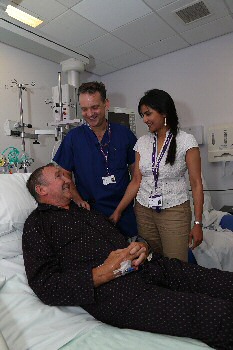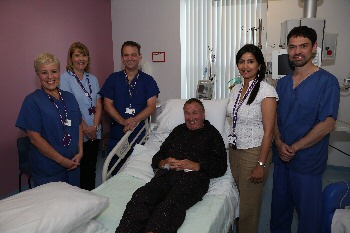|
Liverpool Cardiologists Lead
the Way with Pioneering New Device

LIVERPOOL Heart and Chest Hospital (LHCH)
has been selected as part of a pilot group of specialist heart centres across
Europe to pioneer a newly approved leadless pacemaker.
It has become the 1st hospital in the North West and only the 4th centre in
the UK to trial the new device.
The 1.75g Medtronic device, measuring just 7mm x 26mm, and
1⁄10
the size of
a traditional pacemaker, recently gained CE Mark approval from European
regulators and is now set to be implanted into 780 patients from 50 clinical
centres as part of an on going global trial.
LHCH is at the forefront of pacemaker research and is
1 of Europe's busiest
pacemaker implanting centres, as well as being the largest single site
specialist heart and chest hospital in the country.
LHCH Consultant Cardiologists, Dr Archie Rao and Dr Mark Hall, who performed the
first of its innovative new procedures, said this was a 'breakthrough in
heart rhythm management.'

Dr Rao said:- "This is a real advance in
pacemaker technology, because the absence of leads should hopefully limit the
associated complications that can sometime arise during implantation and
thereafter."
Dr Hall added:- "Having the pacemaker entirely within the heart means no
scar and no visible pacemaker under the skin. A lot of patients will prefer
this. It may also mean that there is a lower risk of infection being transmitted
into the heart as there is no risk of spread from the pacemaker pocket."
Traditional pacemakers are inserted under the skin and connected to the heart by
a lead which is placed in the heart via a vein. The lead carries electrical
signals to correct slow or irregular heartbeats, but they can require
replacement due to broken or dislodged wires.
The new device can be implanted directly in the heart and delivers electrical
impulses from an electrode, removing the need for a lead.
The device, suitable for selected patients with bradycardia, is delivered via a
catheter from the groin and sits within the lower right chamber of the heart
(right ventricle).
Commenting on the care he received from the team who implanted his new device,
73 year old Thomas Nesbitt from Vauxhall said:- "All the doctors, cardiac
physiologists and nurses who looked after me have been wonderful. I couldn't
have wished for better care." |
